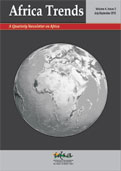Crisis in Eastern Congo and the Role of External Actors
The crisis in eastern DRC cannot be resolved by merely accusing countries like Rwanda and Uganda of interference; Kinshasa has to review its response to the crisis.
- Keerthi Sampath Kumar |
- April 2013 |












